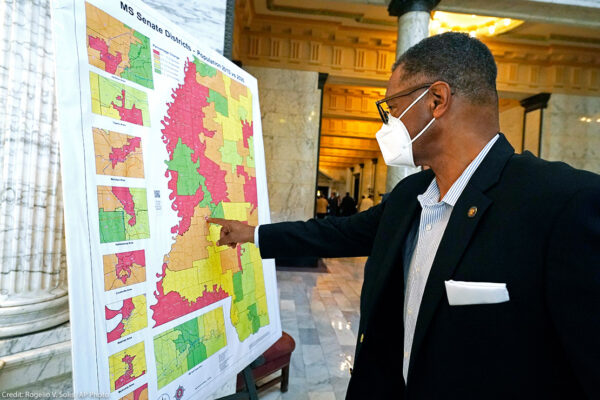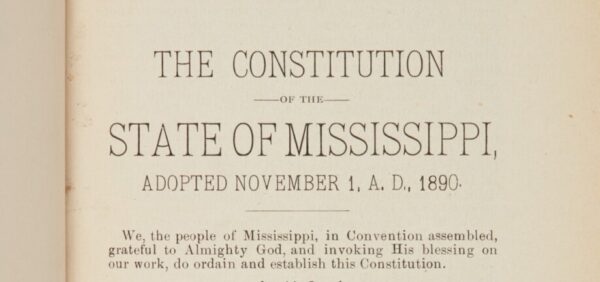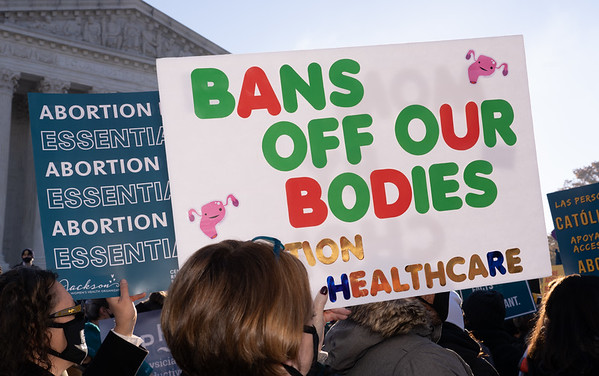Mississippi
Dobbs v. Jackson Women’s Health Organization
The case concerns the constitutionality of a Mississippi law prohibiting abortions after the fifteenth week of pregnancy. The state used the case as a vehicle to ask the Supreme Court to take away the federal constitutional right to abortion it first recognized 50 years before in Roe v. Wade. On June 24, 2022, the Supreme Court of the United States accepted the state’s invitation and overturned Roe eliminating the federal constitutional right to abortion.
Status: Closed (Judgment)
View Case
Featured
Mississippi
Mar 2017

Smart Justice
Prisoners' Rights
Dockery v. Hall
The ACLU, the Southern Poverty Law Center (SPLC), the Law Offices of Elizabeth Alexander, and the law firm of Covington & Burling LLP, filed a petition for class certification and expert reports for a federal lawsuit on behalf of prisoners at the East Mississippi Correctional Facility (EMCF). The lawsuit, which was filed in May 2013, describes the for-profit prison as hyper-violent, grotesquely filthy and dangerous. EMCF is operated "in a perpetual state of crisis" where prisoners are at "grave risk of death and loss of limbs." The facility, located in Meridian, Mississippi, is supposed to provide intensive treatment to the state's prisoners with serious psychiatric disabilities, many of whom are locked down in long-term solitary confinement.
All Cases
22 Mississippi Cases

Mississippi
Jul 2024
Voting Rights
Mississippi State Conference of the NAACP v. State Board of Election Commissioners
Mississippi has a growing Black population, which is already the largest Black population percentage of any state in the country. Yet. Black Mississippians continue to be significantly under-represented in the state legislature, as Mississippi’s latest districting maps fail to reflect the reality of the state’s changing demographics. During the 2022 redistricting process, the Mississippi legislature refused to create any new districts where Black voters have a chance to elect their preferred representative. The current district lines therefore dilute the voting power of Black Mississippians and continue to deprive them of political representation that is responsive to their needs and concerns, including severe disparities in education and healthcare.
Explore case
Mississippi
Jul 2024

Voting Rights
Mississippi State Conference of the NAACP v. State Board of Election Commissioners
Mississippi has a growing Black population, which is already the largest Black population percentage of any state in the country. Yet. Black Mississippians continue to be significantly under-represented in the state legislature, as Mississippi’s latest districting maps fail to reflect the reality of the state’s changing demographics. During the 2022 redistricting process, the Mississippi legislature refused to create any new districts where Black voters have a chance to elect their preferred representative. The current district lines therefore dilute the voting power of Black Mississippians and continue to deprive them of political representation that is responsive to their needs and concerns, including severe disparities in education and healthcare.

Mississippi Supreme Court
May 2024
Criminal Law Reform
Love v. State
This case in the Mississippi Supreme Court is a post-conviction appeal of a pro se defendant, Mr. Soweto Love, who argued that his guilty plea was not entered knowingly, voluntarily, and intelligently. The ACLU’s State Supreme Court Initiative, alongside the ACLU of Mississippi, filed an amicus brief arguing that the law is on Mr. Love’s side, but urging the Court to exercise its discretion to inform Mr. Love that a win could resuscitate his charge and expose him to longer sentences. Consistent with the ACLU amicus brief, the Mississippi Supreme Court held that the trial court had plainly erred by misinforming Mr. Love that his applicable mandatory minimum was one year of imprisonment on each count to which he had pled guilty, when in in fact the mandatory minimum sentence was five years’ imprisonment on each count. The Court remanded Mr. Love’s case to the trial court for an evidentiary hearing.
Explore case
Mississippi Supreme Court
May 2024

Criminal Law Reform
Love v. State
This case in the Mississippi Supreme Court is a post-conviction appeal of a pro se defendant, Mr. Soweto Love, who argued that his guilty plea was not entered knowingly, voluntarily, and intelligently. The ACLU’s State Supreme Court Initiative, alongside the ACLU of Mississippi, filed an amicus brief arguing that the law is on Mr. Love’s side, but urging the Court to exercise its discretion to inform Mr. Love that a win could resuscitate his charge and expose him to longer sentences. Consistent with the ACLU amicus brief, the Mississippi Supreme Court held that the trial court had plainly erred by misinforming Mr. Love that his applicable mandatory minimum was one year of imprisonment on each count to which he had pled guilty, when in in fact the mandatory minimum sentence was five years’ imprisonment on each count. The Court remanded Mr. Love’s case to the trial court for an evidentiary hearing.

Mississippi
Dec 2023
Voting Rights
Hopkins v. Watson (Amicus)
Mississippi is home to one of the strictest felon disenfranchisement schemes in the nation. The Mississippi Constitution permanently disenfranchises citizens upon a single felony conviction for certain crimes, including minor offenses like writing a bad check. As a result, the loss of rights under Mississippi’s scheme is mandatory, permanent, and effectively irrevocable. In Hopkins, plaintiffs, a class of formerly incarcerated individuals who lost their right to vote despite completing their sentences, argued that their disenfranchisement violated the Eighth Amendment’s prohibition on cruel and unusual punishment. A three-judge panel of the U.S. Court of Appeals for the Fifth Circuit ruled in the plaintiffs’ favor and struck down Mississippi’s disenfranchisement scheme as cruel and unusual punishment. But the Fifth Circuit decided to rehear the case en banc, a rare occurrence in which a case is reconsidered by the entire panel of the circuit’s active judges.
Explore case
Mississippi
Dec 2023

Voting Rights
Hopkins v. Watson (Amicus)
Mississippi is home to one of the strictest felon disenfranchisement schemes in the nation. The Mississippi Constitution permanently disenfranchises citizens upon a single felony conviction for certain crimes, including minor offenses like writing a bad check. As a result, the loss of rights under Mississippi’s scheme is mandatory, permanent, and effectively irrevocable. In Hopkins, plaintiffs, a class of formerly incarcerated individuals who lost their right to vote despite completing their sentences, argued that their disenfranchisement violated the Eighth Amendment’s prohibition on cruel and unusual punishment. A three-judge panel of the U.S. Court of Appeals for the Fifth Circuit ruled in the plaintiffs’ favor and struck down Mississippi’s disenfranchisement scheme as cruel and unusual punishment. But the Fifth Circuit decided to rehear the case en banc, a rare occurrence in which a case is reconsidered by the entire panel of the circuit’s active judges.

U.S. Supreme Court
May 2023
Voting Rights
Racial Justice
Harness v. Watson (Amicus)
Whether Mississippi’s 1890 felony disenfranchisement law, adopted for the express purpose of disenfranchising Black voters, violates the Fourteenth Amendment’s Equal. Protection Clause.
Explore case
U.S. Supreme Court
May 2023

Voting Rights
Racial Justice
Harness v. Watson (Amicus)
Whether Mississippi’s 1890 felony disenfranchisement law, adopted for the express purpose of disenfranchising Black voters, violates the Fourteenth Amendment’s Equal. Protection Clause.

U.S. Supreme Court
Dec 2021
Juvenile Justice
Jones v. Mississippi
Whether the Eighth Amendment requires a judge or jury to make a finding that a juvenile is “permanently incorrigible” before imposing a sentence of life without parole.
Explore case
U.S. Supreme Court
Dec 2021

Juvenile Justice
Jones v. Mississippi
Whether the Eighth Amendment requires a judge or jury to make a finding that a juvenile is “permanently incorrigible” before imposing a sentence of life without parole.
